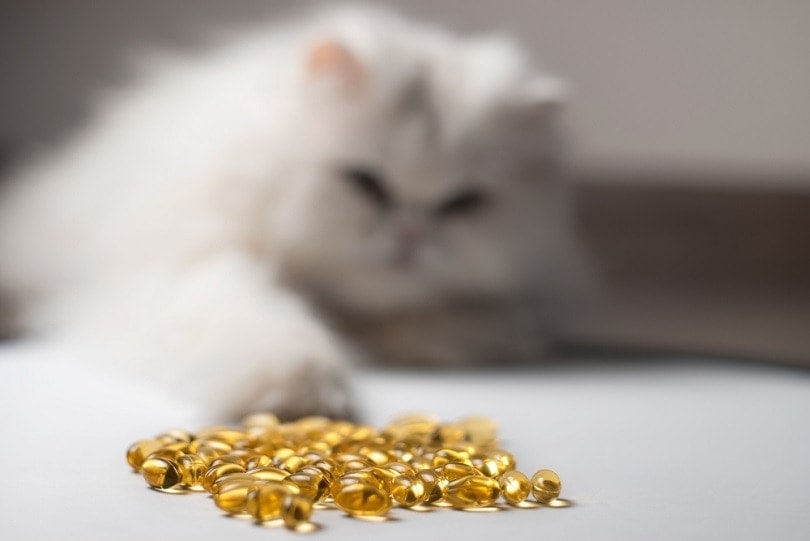
While shopping for cat food you may have noticed that many recipes include fish oil in their ingredient list, especially higher-quality recipes. You may have even seen some fish oil supplements on the shelves of your local pet store.
Fish oil is one of the more common supplements recommended for cats. It’s thought to work similarly to people, helping their skin and coat. However, it may also impact brain health, as it does in humans.
Before giving fish oil to your feline, though, keep reading to learn about everything you need to know.
What Are the Benefits of Fish Oil for Cats?
Fish oil is a type of fat that comes from fish. It’s rich in omega-3 fatty acids, which is why it’s commonly given as a supplement. In humans, omega-3s are thought to improve brain health, help with joint pain, and even promote hair growth. Some studies in cats have found that fish oil may help cardiovascular function and lower inflammation.1
Generally speaking, fish oil is considered to be a good thing. Therefore, many cat food recipes have started including it, even if they aren’t fish-based. It isn’t considered a necessary nutrient, but many cat food brands treat it as such.

How is Fish Oil Given?
Typically, fish oil is added to a cat’s food. Because it is animal fat, many cats like the taste of it. Therefore, it isn’t usually difficult to get them to eat it. However, you’ll still find the odd cat that doesn’t like the taste of added fish oil on top of their food. In some cases, it’s best to pick a cat food that already has fish oil added if you’re interested in giving it to your feline.
You may also find treats with added fish oil. These provide an alternative to switching your cat’s regular food. For instance, if your cat is on prescription food, you can’t exactly switch their diet. In this case, choosing a quality treat with added fish oil may be the best option.
What Happens If You Miss a Dose?
Fish oil builds up in your cat’s system over time. This is both a good and a bad thing. On one hand, it will take a little bit before you notice any differences in your cat’s behavior or health. On the other hand, if you miss a dose, it isn’t a big deal. Simply continue with their normal dosage schedule whenever the next time rolls around.
Overdosing on fish oil is also extremely difficult. If anything, fish oil causes stomach upset if it’s taken in excess. However, this is often minor and goes away quickly. Therefore, you don’t have to be too worried about giving your cat too much.
Potential Side Effects of Fish Oil
Fish oil is a very safe substance that isn’t associated with many side effects. If you give it in too high of a dosage, it may cause stomach upset. As stated, though, this will likely be extremely minor and dissipate fairly quickly. It helps to give the fish oil with food to help prevent this issue.
If given excessively, fish oil may also cause weight gain, though this is rare. It is a fat that contains calories; keep this in mind when adding it to your cat’s food.
It may also cause bad breath from time to time. It does have a fishy odor, and cats will often develop this odor while they’re digesting it. Of course, bad breath isn’t particularly problematic, though.

Frequently Asked Questions (FAQs)
Can I give human fish oil to my cat?
We don’t recommend it, as the dosage is probably different than what your cat needs. You are much bigger than your cat, so you require a much higher dosage. Human supplements will be designed with that dosage in mind.
How much fish oil should I give my cat?
All fish oil is different, so you should follow the instructions on the supplement bottle. If you’re using cat food with fish oil already added in, just feed your cat the amount of food they would typically eat. Most of the time, the recommended dosage is around 200 mg of DHA per 10 pounds.
Is fish oil or olive oil better for cats?
Typically, fish oil is recommended, simply because it is a fat that occurs naturally in animals. While cats would eat fish if given the chance, you’d be hard-pressed to find a wild cat eating olives. However, in reality, there isn’t that much difference between fish oil and olive oil.
Conclusion
Fish oil is a relatively safe and beneficial addition to your cat’s diet. Today, many cat foods have added fish oil to help keep their customer’s cats happy and healthy. You can also find plenty of fish oil supplements available if you want to add extra to your cat’s diet.
As always, speak with your vet before supplementing, especially if your cat is experiencing serious health issues. While fish oil can be helpful, it isn’t a treatment for more severe health conditions.
Featured Image Credit: hppphnts, Shutterstock




